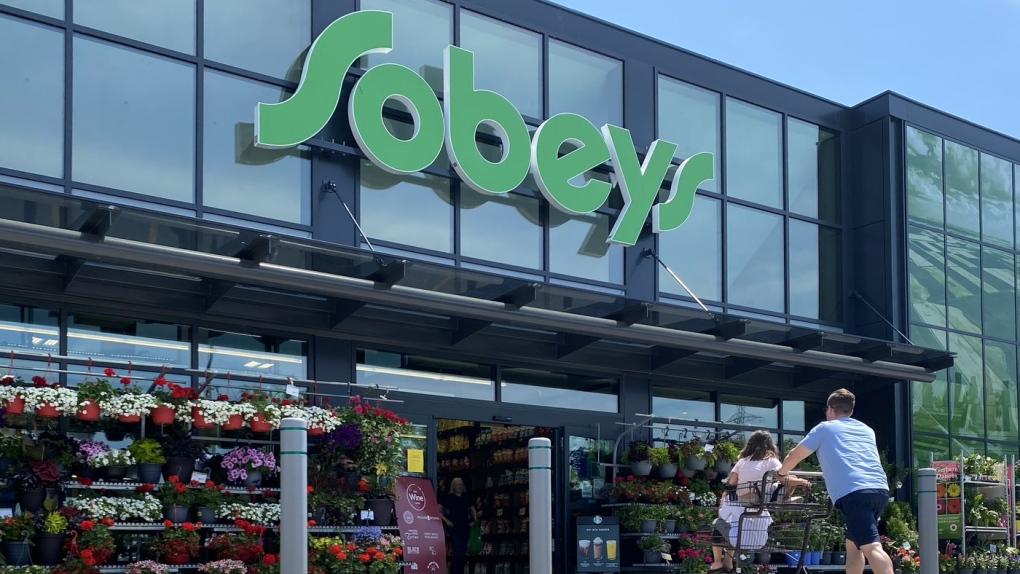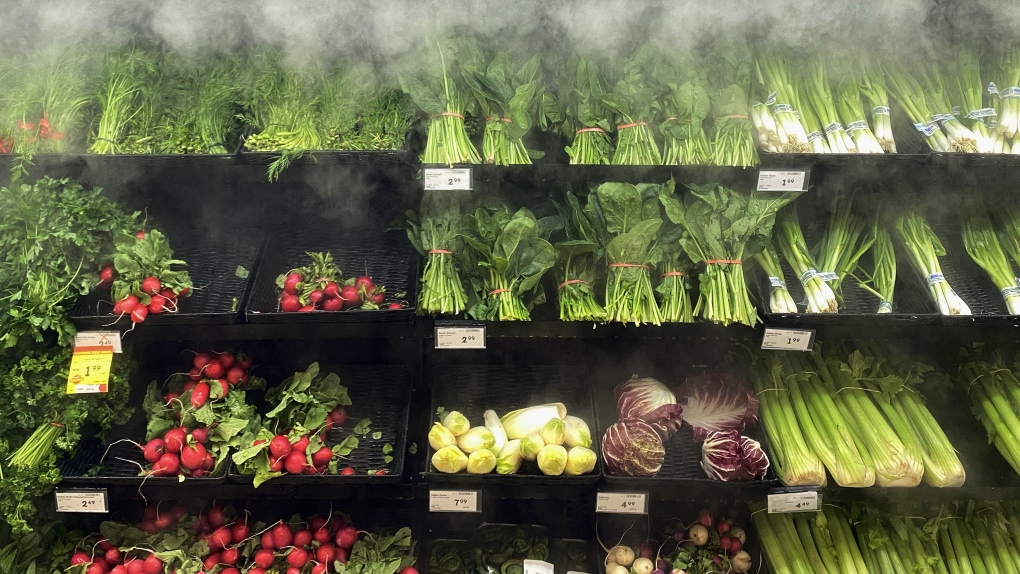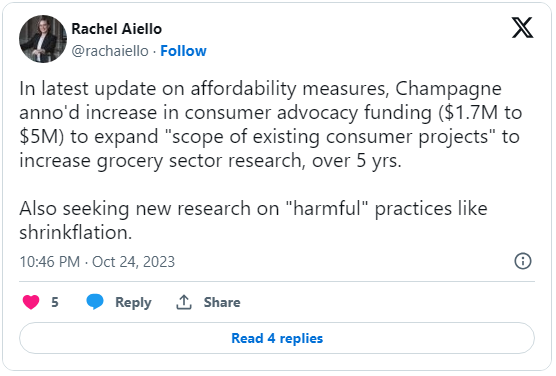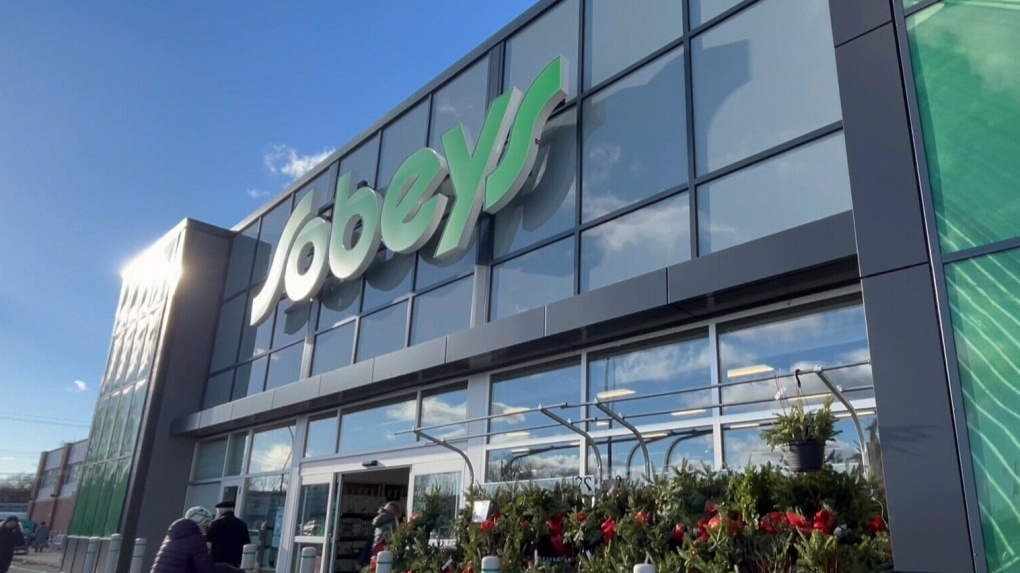
Shoppers at a west-end Toronto Sobeys grocery store, Sunday, June 26, 2023. (THE CANADIAN PRESS/Graeme Roy)
Major Canadian grocer Empire, the parent company of Sobeys, confirmed it will expand price freezes on several products between November 2023 and January 2024.
A month ago, major grocers in Canada did not confirm whether they were committed to special promotions to stabilize grocery prices despite promises by the federal government to alleviate inflation and the rising cost of living for Canadians.
Now, Empire confirmed it will be expanding its price-freezing practice to 20,000 of its packaged products in the coming months, the company said in an emailed statement to CTV News Toronto Tuesday.
“This is a meaningful step-up from prior years and has resulted in cancelling price increases on approximately 1,700 additional products initially planned to occur during this timeframe,” a spokesperson for Empire said.
Empire adds it typically implements price freezes on 90 per cent of all packaged products from November to January annually, with exceptions in certain scenarios.
Price increase cancellations will remain in place regardless of any internal or external conditions that might cause prices to go up, according to the company.
The federal government gave an ultimatum to major grocers in September, saying they should present plans to stabilize grocery prices by Thanksgiving or face potential tax measures as a consequence.
The move came in response to concerns that Canadian families were struggling to put food on the table as grocery prices continued to climb rapidly. Grocery prices in August were 6.9 per cent higher than they were a year ago, according to StatCan.
“We also have significant and meaningful plans in development to continue to help stabilize food prices past February” the company said.
Empire’s announcement comes after Statistics Canada reported a 3.1 per cent slowdown
in the annual inflation rate in October, down from 3.8 per cent in September.
Statistics Canada said the largest contributors to inflation continued to be mortgage interest costs, food purchased from stores and rent.
While grocery prices rose faster than overall inflation, Statistics Canada said the pace continued to slow. Grocery prices were up 5.4 per cent year-over-year in October compared with 5.8 per cent higher in September.

Produce is shown at a west-end Toronto Sobeys grocery store, Sunday, June 26, 2023. THE CANADIAN PRESS/Graeme Roy
OTTAWA – A House of Commons committee is asking the heads of Canada’s major grocery chains to appear before MPs and explain their plans to stabilize food prices.
The agriculture committee passed an NDP motion last Thursday to invite the grocery executives, or summon them if necessary, to testify about the measures their companies are taking to address food inflation.
Earlier this fall, Industry Minister Francois-Philippe Champagne announced the major Canadian grocery companies — Loblaw, Metro, Empire, Walmart and Costco — had presented to the government their plans to tackle rising prices, which he says included discounts, price freezes and price-matching campaigns.
Champagne offered few details about these promotions at the time, saying he wanted the grocers to compete with one another.
Most grocers have also not confirmed the details of their plans. The motion at the parliamentary committee is asking the grocers to submit “a comprehensive report on their strategies and initiatives taken to date and on further actions aimed at the stabilization of grocery prices in Canada.” The deadline for the submissions is Nov. 2.
It is also inviting Champagne and Finance Minister Chrystia Freeland to appear before committee to answer questions.
The Canadian Press reached out to the grocers on Tuesday for comment on the parliamentary committee’s motion.
Sarah Dawson, aspokeswoman for Sobeys, said the company has not yet received an invitation or request from the committee but that it has “every intention of participating if asked.” She said Sobeys has shared its plans with Champagne, noting they “include some of the novel measures” mentioned by the minister.
“Our plans are competitively sensitive and we do not plan to discuss them publicly before they are launched in our stores,” she added.
Metro declined to comment, while the others did not immediately respond.
The Canadian Press had asked the grocers earlier this month for more details on their pledges to the federal government.
Walmart was the only company to weigh in, with a spokeswoman saying the company promised to continue offering “everyday low prices,” which refers to its strategy of offering low prices on a regular basis, rather than on promotion only.
In an interview with The Canadian Press on Oct. 16, Champagne said he wishes the grocers were “more forthcoming” about their plans.
The federal government is taking other steps aimed at addressing high grocery prices.
On Tuesday, Champagne announced more funding for non-profit consumer advocacy organizations to help fund projects that focus on retail practices that hurt consumers, and on the development of tools that help consumers make informed decisions and save costs.
Prime Minister Justin Trudeau announced the decision to pressure grocers to tackle rising prices in September, one of several affordability measures from the Liberals after a summer of polling showing growing support for the Conservatives.
The Conservatives have been hammering the Liberals over the cost of groceries, blaming them on Liberal spending, while the NDP Leader Jagmeet Singh has said the Liberal government’s “plan to ask CEOs nicely to reduce prices is ridiculous.”
Grocery prices have risen in Canada at a faster rate than overall inflation, although they have also risen dramatically around the world, with many countries seeing food prices rise at an even faster rate.

OTTAWA – Industry Minister Francois-Philippe Champagne says he wishes Canadian grocers would be more forthcoming with the public about their plans to stabilize prices.
Earlier this month, Champagne announced that major Canadian grocers — Loblaw, Metro, Empire, Walmart and Costco — submitted initial plans to the federal government for how they will stabilize prices in the face of high inflation.
The Liberal government summoned the heads of the companies to meet in Ottawa last month, demanding they present such a plan by Thanksgiving or face potential tax measures.
At the announcement on Oct. 5, Champagne said those plans included discounts, price freezes and price-matching campaigns. He didn’t divulge many details at the time, saying he wanted the grocers to compete with one another.
But in an interview with The Canadian Press on Monday, Champagne said he wishes the grocers were willing to be more open.
“I wish they would be more forthcoming,” Champagne said.
“They’ve been outlining to us the kind of things (they) intend to do, but I think they have perhaps historically been different in how they approach the market. They say, ‘We’re going to tell the market when we do it,’ but they are a bit concerned of telling in advance what they’re going to do.”
The issue of affordability — especially when it comes to housing and the cost of food — has been dominating political discourse for months, with both the Conservatives and NDP demanding the Liberal government do more to help Canadians struggling to pay the bills.
Grocery prices have risen in Canada at a faster rate than overall inflation, although they have also risen dramatically around the world. Many countries have seen food prices rise faster than in Canada.
Support for the Conservatives, who have focused heavily on that issue for months, has also been rising in the polls, at the expense of the Liberals.
The decision to pressure grocers to tackle rising prices was one of several affordability measures Prime Minister Justin Trudeau announced after a Liberal caucus retreat in September.
“During the summer, I think all of us went out and listened to Canadians about everywhere. And it became very clear when we met at our retreat with caucus that what we heard from Canadians was really around housing and around affordability,” Champagne said.
But the opposition has not welcomed the approach to the problem.
The Conservatives have been hammering the Liberals over the cost of groceries, blaming the prime minister for these price increases due to his government’s “deficit spending.”
NDP Leader Jagmeet Singh has said the Liberal government’s “plan to ask CEOs nicely to reduce prices is ridiculous.”
Still, it remains unclear what else Champagne could do, given groceries, unlike telecommunications, are not a federally regulated industry.
The lack of details from the grocers themselves does not add clarity.
The Canadian Press reached out to the grocers last week to request more details on their pledges to the federal government.
Loblaw and Costco did not respond and Metro declined to comment. A spokeswoman for Walmart said the company promised to continue offering “everyday low prices,” which refers to its strategy of offering low prices on a regular basis, rather than on promotion only.
Meanwhile, a spokeswoman for Sobeys, which is owned by Empire, responded on Friday to say the company isn’t disclosing its plan for competitive reasons.
“Our plans are competitively sensitive and we do not plan to discuss them before they are launched in our stores,” said Karen White-Boswell, Empire’s director of external communications.
Michael von Massow, a food economy professor at the University of Guelph, says the whole process between the federal government and grocers has been a “mess.”
He said in an interview on Tuesday that the federal government has been unclear about its goals, and that there’s not much it can actually do on the issue.
“The government’s kind of stuck between a rock and a hard place,” von Massow said.
“I think the government is getting blamed for things that are outside of their control, and is looking to get credit for things that are also outside of their control.”
European countries have also tried to address the issue of rising grocery prices, with grocers coming out with price reductions and freezes for certain products.
In the U.K., grocery giant Asda announced in June its plans to freeze prices on 500 products until the end of August. The French government reached a three-month agreement with supermarket chains earlier this year for them to cut prices on hundreds of staples and other foods.
Although Champagne has regularly pointed to these countries as examples to follow, he said Canadian grocers aren’t used to government intervention, and calling them into a meeting in Ottawa was already a big step for the federal government to take.
“We’re shaking the tree,” Champagne said. “This is not a regulated industry (like) telecom where they’re used to working with government to achieve outcomes.”
Von Massow said it’s unclear how much success European countries have had with their initiatives. At the same time, he agreed with Champagne’s point that the relationships in Canada are different.
“France has been much more involved in managing grocery prices before, so they have more history. So it’s difficult to come from zero to 100 miles an hour and say we’re going to do what France has done,” he said.
The Liberals have said that getting grocers to stabilize prices is a way of taking immediate action to address people’s financial anxieties, but Champagne acknowledged during the interview that the solution to high grocery prices, in the long run, depends on competitive forces.
“(The) bottom line is that three companies in Canada, three large grocers, control more than 60 per cent of the market. And the best way to address that and stabilize prices over the mid- to long-term is to create more competition,” Champagne said.
The Liberals have also introduced legislation that would make several changes to the country’s competition law, including empowering the Competition Bureau to go after anticompetitive collaborations, such as real estate agreements that prohibit a competitor from opening shop nearby.
The federal government has long pledged a broader overhaul of the Competition Act, something many experts are hoping for as well.
Champagne said reform is going to happen, though he wouldn’t say when.
Although the latest data from Statistics Canada shows that monthly increases in food prices may be slowing down, the cost of groceries in Canada remains high. From vegetables to fresh and frozen beef, many are feeling the financial strain of food inflation.
To combat the high prices, many have started to rely on budgeting and coupon apps. A recent survey by Dalhousie University’s Agri-Food Analytics Lab in Halifax has revealed that 15.5 per cent of respondents have even started growing their own food in the last year.
Out of approximately 5,000 Canadians involved in the survey, 45.5 per cent said they are prioritizing cost over nutrition when buying groceries.
This may be detrimental in the long run if healthy foods continue to rise in cost. But who is to blame for high grocery prices? Unfortunately, no one person or thing is responsible for driving up food costs in Canada. Below, I’ll outline some of the key factors that have contributed to rising grocery prices in recent months.
1. Climate change and extreme weather conditions
Devastating wildfires continue to rage across Canada, destroying forests and farmland, even leaving burn scars that are visible from space. Aside from interfering with farming cycles, these wildfires have also caused logistical problems with transporting food, as vehicles have had to reroute their trucks or put deliveries on hold until a safe path opens.
A severe drought in 2021 also led to a sharp drop in the production of domestic wheat, canola, and barley in the Prairies, all of which are key ingredients in many everyday foods.
Aside from these extreme weather events, the effects of climate change as a whole are expected to continue affecting Canadian farms and agricultural production.
The country’s agricultural regions are expected to see drier summers and wetter winter and spring seasons in the coming years, according to Agriculture Canada.
This could lead to farms receiving too much water in the planting season and too little water in the growing season, which could lead to reduced crop output.
2. Global supply chain disruptions
The COVID-19 pandemic caused supply chain disruptions across the globe, many of which affected Canada’s ability to quickly and reliably import food from other countries.
This led to increased costs for farmers, food production facilities, transportation companies, and grocers, which may have resulted in higher grocery costs for consumers over recent years.
3. The war in Ukraine
Ukraine is often regarded as the “breadbasket” of Europe because it is one of the continent’s largest producers of grain and corn. Although Canada produces a large amount of its own grain, recent droughts and wildfires have reduced domestic production, causing a greater reliance on foreign agriculture.
The ongoing war in Ukraine has limited the country’s ability to safely farm, produce, and export agricultural products. As of May, 90 per cent of agricultural businesses in Ukraine lost revenue and 12 per cent reported lands contaminated with mines, according to the UN Food and Agriculture Organization. In 2022, the amount of land planted with grain fell to 11.6 million hectares (28.6 million acres) from 16 million hectares (about 40 million acres) in 2021.
4. High gas and electricity prices
Energy costs continue to rise across Canada, with Alberta seeing a 122 per cent increase in electricity prices in August, compared to the same time last year. Additionally, prices for both gasoline and diesel fuel also remain high across Canada.
In an interview with CTVNews.ca in August, Michael Manjuris, professor and chair of global management studies at Toronto Metropolitan University, blamed rising gas prices on poor weather and a lack of crude oil supply.
Farms, food manufacturers, grocers and transport companies all rely on fuel and electricity to maintain their operations. Farmers and transportation companies must fuel their equipment and trucks, just as warehouses and grocers need electricity to keep food safe and in climate-controlled units.
In order to keep up with production, companies are having to pay higher energy costs, resulting in price increases across the board.
5. Decline in Canadian versus U.S. dollar value
Every year, Canada imports billions of dollars worth of food from the U.S., according to data from Trading Economics. Unfortunately, the value of the Canadian dollar compared to the U.S. dollar has remained low, and $1 is currently only worth 73 cents U.S. at the time of writing – a 12 per cent decrease from 83 cents U.S., the exchange rate recorded in June 2021.
This means that Canadian dollars have reduced purchasing power for U.S. imports, and it is more expensive for Canadian companies to import food from American suppliers. Unfortunately, these expenses are often passed on to consumers.
6. Grocery store pricing
Earlier this year, the presidents and CEOs of major grocery chains were grilled by members of Parliament over inflated grocery prices. The heads of Loblaw Companies, Metro and Empire Company Limited appeared in front of a parliamentary committee in March amid calls from federal politicians for more transparency around what is leading to record-high profits.
At the time, grocery leaders insisted that food inflation was not caused by price gouging. Additionally, experts such as Michelle Waslylyshen of the Retail Council of Canada have stated that grocery prices “are largely dependent on what suppliers ask them to pay for their products.”
However, a sizable number of Canadians have said they believe grocery stores are responsible for high food costs. This is according to the Dalhousie University Agri-Food Analytics Lab study referenced above.
Based on the survey, between 30 to 33 per cent of respondents in provinces such as British Columbia, Alberta, Ontario, New Brunswick and Manitoba said price gouging was the main issue behind grocery price hikes.
Ultimately, it doesn’t appear as though there is enough evidence to conclude that grocers are directly engaging in price-gouging practices. Despite this, major grocers are continuing to work with the federal government to tackle food inflation. The CEOs of Canada’s five largest grocery chains recently agreed to work with the government to stabilize prices, although the process could take months, according to Industry Minister François-Philippe Champagne.
OTTAWA – Major grocers in Canada are not yet confirming whether they have committed to special promotions to stabilize grocery prices, as was recently promised by the federal government.
Industry Minister Francois-Philippe Champagne announced last week that the grocers have presented initial plans to stabilize prices, which include discounts, price freezes and price-matching campaigns.
The Canadian Press has reached out to the grocers — Loblaw, Empire, Metro, Walmart and Costco — to confirm what exactly each of them has promised to do.
Metro declined to comment, while Loblaw, Empire and Costco have not responded to requests for information.
In a written response, a spokeswoman for Walmart Canada said the company plans to keep offering “every day low prices,” which refers to Walmart’s strategy of offering low prices on a regular basis, rather than on promotion only.
“Last week, we shared with the government how we will continue to deliver every day low prices for Canadians during these challenging times,” said Stephanie Fusco, senior manager of corporate affairs.
“We’re taking action to fight inflation and keep prices low and, in our submission, also provided several suggestions on the role government and regulators can play in curtailing food price inflation for Canadians.”
The federal government gave an ultimatum to grocers in September, saying they should present plans to stabilize grocery prices by Thanksgiving or face potential tax measures as a consequence.
The move came in response to the pressure Canadian families are facing as grocery prices continue to rapidly climb. Grocery prices in August were 6.9 per cent higher than they were a year ago. Meanwhile, the country’s overall inflation rate was 4.0 per cent.
Recent polls show support for the governing Liberals dropping as affordability remains top-of-mind for voters.
Champagne’s announcement last week on the commitments from grocers included little detail. The minister did not provide clarify whatproducts may be subject to special promotions, for example.
When pressed by reporters on how Canadians will know these promotions are any different than the ones regularly offered by grocers, Champagne said he does not want to disclose what each company has pledged to do.
“I’m saying those are examples of what we see in the plans, because I want the market to compete. I cannot say I received that from Loblaws, I received that from Metro, I received that from Costco, I received that from Walmart,” he said on Thursday.
“Each grocer has different actions. So it will be up to Canadians to judge them.”
NDP Leader Jagmeet Singh slammed the Liberals’ approach on grocery prices during a news conference last week, saying their “plan to ask CEOs nicely to reduce prices is ridiculous.”
The industry minister has repeatedly pointed to other countries, such as France and the U.K., as examples for grocers to follow, as countries around the world have struggled with skyrocketing food prices.
In August, the annual rate of food inflation was 13.6 per cent in the United Kingdom and 9.8 per cent in the eurozone.
The French government reached a three-month agreement with supermarket chains earlier this year for them to cut prices on hundreds of staples and other foods, which is expected to be extended through the summer.
In the U.K., grocery giant Asda announced in June its plans to freeze prices on 500 products until the end of August.
Other European countries have mandated price controls for staple foods. Hungary, for example, put price caps in place last year for products such as eggs and potatoes.

